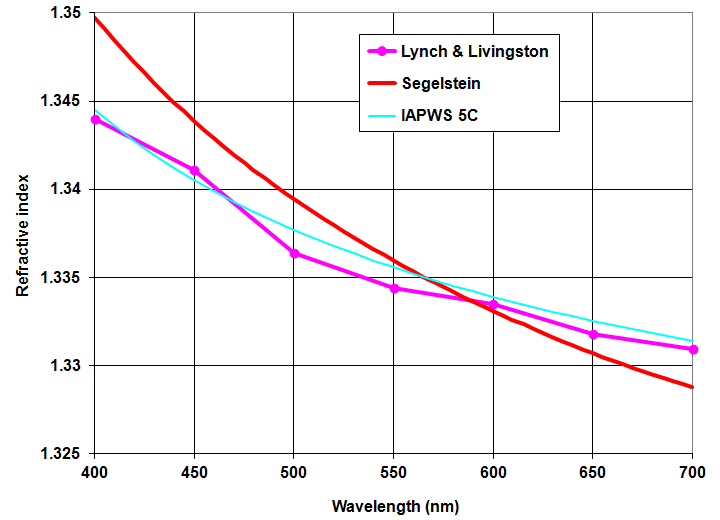Randy Holmes-Farley
Reef Chemist
View Badges
Staff member
Super Moderator
Excellence Award
Expert Contributor
Article Contributor
R2R Research
My Tank Thread
- Joined
- Sep 5, 2014
- Messages
- 67,276
- Reaction score
- 63,622
I was recently asked whether the light impacts the results one gets with a refractometer.
I'll give the rationale below, but it turns out it is CRITICAL that you use the same color light for calibration as for measurement. Don't move to a different room of your house where the lights may be different.
The reason for this is that the refractive index of water (fresh or salt) changes a lot with wavelength. The standard for all visible light refractive index measurements is supposed to be yellow (specifically, the yellow doublet sodium D line, with a wavelength of exactly 589 nanometers), but reefers rarely worry about such complexities.
The link below shows how much the refractive index of pure fresh water changes with wavelength (color):
Refractive index
specifically, here's a graph:

Look, for example, at the difference between deep blue (say, 480 nm) and orange (about 650 nm). Let's look at just the light blue line. That difference, from about 1.339 to 1.3325 is, remarkably, about the same as the difference between pure fresh water (RI = 1.33300) in yellow light and natural seawater (1.33940) in yellow light.
So the color effect on refractive index is as large as the entire difference between salt and fresh water.
However, we have a big saving feature at work. As long as you calibrate and measure in the same light (same color), the overall effect of the change in refractive index with light color largely cancels out between the calibration and the measurement, and you are able to sort out what portion of the effect comes from the added salts in the aquarium.
What you cannot do is calibrate under one type of light, and then measure tank water under a different set of lights (for example, in a room with fluorescents vs a room with incandescent lights or outside, or in a basement and then next to a tank with a lot of blue light.
Of course, rarely would someone have such extreme light differences as the deep blue vs orange mentioned above, but that is a 100% error in the salt concentration (ie., salinity might be really 1 ppt or sg = 1.001 when the refractometer says 35 ppt or sg = 1.026). I assume most reefers would like the salinity measurement to be far, far better than that, and so paying attention to the color of the light within the range aquarists might actually encounter is important.
So be sure and calibrate and measure in the same location if using a refractometer!
I'll give the rationale below, but it turns out it is CRITICAL that you use the same color light for calibration as for measurement. Don't move to a different room of your house where the lights may be different.
The reason for this is that the refractive index of water (fresh or salt) changes a lot with wavelength. The standard for all visible light refractive index measurements is supposed to be yellow (specifically, the yellow doublet sodium D line, with a wavelength of exactly 589 nanometers), but reefers rarely worry about such complexities.
The link below shows how much the refractive index of pure fresh water changes with wavelength (color):
Refractive index
specifically, here's a graph:

Look, for example, at the difference between deep blue (say, 480 nm) and orange (about 650 nm). Let's look at just the light blue line. That difference, from about 1.339 to 1.3325 is, remarkably, about the same as the difference between pure fresh water (RI = 1.33300) in yellow light and natural seawater (1.33940) in yellow light.
So the color effect on refractive index is as large as the entire difference between salt and fresh water.
However, we have a big saving feature at work. As long as you calibrate and measure in the same light (same color), the overall effect of the change in refractive index with light color largely cancels out between the calibration and the measurement, and you are able to sort out what portion of the effect comes from the added salts in the aquarium.
What you cannot do is calibrate under one type of light, and then measure tank water under a different set of lights (for example, in a room with fluorescents vs a room with incandescent lights or outside, or in a basement and then next to a tank with a lot of blue light.
Of course, rarely would someone have such extreme light differences as the deep blue vs orange mentioned above, but that is a 100% error in the salt concentration (ie., salinity might be really 1 ppt or sg = 1.001 when the refractometer says 35 ppt or sg = 1.026). I assume most reefers would like the salinity measurement to be far, far better than that, and so paying attention to the color of the light within the range aquarists might actually encounter is important.
So be sure and calibrate and measure in the same location if using a refractometer!
Last edited:

















